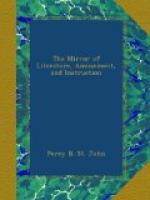As he spoke, he threw the fatal weapon into the blazing turf-fire.
“There,” he said, “take me who likes—and let fire cleanse blood if it can.”
The pause still continuing, Robin Oig asked for a peace-officer, and a constable having stepped out, he surrendered himself.
“A bloody night’s work you have made of it,” said the constable.
“Your own fault,” said the Highlander. “Had you kept his hands off me twa hours since, he would have been now as well and merry as he was twa minutes since.”
“It must be sorely answered,” said the peace-officer.
“Never you mind that—death pays all debts; it will pay that too.”
The constable, with assistance, procured horses to guard the prisoner to Carlisle, to abide his doom at the next assizes. While the escort was preparing, the prisoner, before he was carried from the fatal apartment, desired to look at the dead body, which had been deposited upon the large table, (at the head of which Harry Wakefield had just presided) until the surgeons should examine the wound. The face of the corpse was decently covered with a napkin. Robin Oig removed the cloth, and gazed on the lifeless visage. While those present expected that the wound, which had so lately flooded the apartment with gore, would send forth fresh streams at the touch of the homicide, Robin Oig replaced the covering, with the brief exclamation, “He was a pretty man!”
My story is nearly ended. The unfortunate Highlander stood his trial at Carlisle. I was myself present. The facts of the case were proved in the manner I have related them; and whatever might be at first the prejudice of the audience against a crime so un-English as that of assassination from revenge, yet when the national prejudices of the prisoner had been explained, which made him consider himself as stained with indelible dishonour, the generosity of the English audience was inclined to regard his crime as the aberration of a false idea of honour, rather than as flowing from a heart naturally savage, or habitually vicious. I shall never forget the charge of the venerable judge to the jury.
“We have had,” he said, “in the previous part of our duty, (alluding to some former trials,) to discuss crimes which infer disgust and abhorrence, while they call down the well-merited vengeance of the law. It is now our still more melancholy duty to apply its salutary, though severe enactments to a case of a very singular character, in which the crime (for a crime it is, and a deep one) arose less out of the malevolence of the heart, than the error of the understanding—less from any idea of committing wrong, than from an unhappily perverted notion of that which is right. Here we have two men, highly esteemed, it has been stated, in their rank of life, and attached, it seems, to each other as friends, one of whose lives has been already sacrificed to a punctilio, and the other is about to prove the vengeance of the offended laws; and yet both may claim our commiseration at least, as men acting in ignorance of each other’s national prejudices, and unhappily misguided rather than voluntarily erring from the path of right conduct.




